All published articles of this journal are available on ScienceDirect.
Medical Students’ Knowledge and Attitude Towards Artificial Intelligence: An Online Survey
Abstract
Introduction:
Within the near future, doctors can be anticipated to encounter patients in very distinctive wellbeing care settings compared with the present time. As a result, artificial intelligence will be an essential tool.
Objectives:
The purpose of this study is to investigate the attitudes of Jordanian medical students regarding Artificial Intelligence (AI) and Machine Learning (ML). Moreover, to estimate the level of knowledge and understanding of the effects of AI on medical students.
Methods:
Nine hundred medical students from six universities in Jordan participated in this survey. The participants were asked to fill out an electronic pre-validated questionnaire using Google’s forms and those forms were published via social media. The questionnaire included questions of Likert and dichotomous questions.
Results:
89% of the students believed in the importance of AI in the medical field, and 71.4% believed in the beneficiary of teaching AI in the medical career. 47% of the students had an understanding of the basic principles of AI, 68.4% of the students believed that it is mandatory for medical students to receive knowledge of AI. Statistically, students who received teaching/training in AI were more likely to consider radiology as a career given the advancement in AI (p = 0.000).
Conclusion:
Medical students in Jordanian universities appreciate the importance of artificial intelligence and machine learning in medical advancements. Adding courses and training related to artificial intelligence and machine learning to the study plan should be considered.
1. INTRODUCTION
Artificial intelligence (AI) is simulating human attitudes and abilities using computers and technology by teaching machines how humans think, behave, and react toward different situations [1]. AI has a significant effect on the development of many sectors, economics, manufacturing, education and health [2]. AI is improving quickly, and its application in the field of medicine is increasing [2]. It is becoming increasingly popular in many medical fields; including ophthalmology [3], dermatology [4], and pathology [5]. Machine learning (ML) is one division of AI which is involved in teaching machines to classify different medical illnesses based on images, sounds or any data source [6]. ML can also help in diagnosis, finding treatment options, smart health records and many other applications [1]. AI and ML would play an essential part in enhancing medicine in the future [2] and support the future needs of medicine by analyzing the enormous amounts and various forms of data that patients and healthcare institutions record at every moment [7].
Within the near future, doctors can be anticipated to encounter patients in very distinctive wellbeing care settings compared with the present time and hence, restorative instruction must advance [6]. Omnipresent and digitalized wellbeing care frameworks permit both doctors and patients to obtain biomedical data easily [7]. In addition, progressed restorative advances will lead doctors to experience a developing number of more inactive patients with incessant conditions and comorbidities due to drawn-out life spans [8]. Exponentially extending restorative information requires doctors to upgrade, not review, what they know and select the ideal data from an excess of alternatives. AI can diminish the burden of doctors within the associated interruption of computerized information and can progress their capacity to analyze [9]. Subsequently, the non-analytical, humanistic viewpoint of medication will be more emphasized since it is troublesome to supplant with innovation. Hence, collaboration between physicians and machines has the greatest potential to improve clinical decision-making and patient health outcomes [10, 11]
Moreover, it is essential to have medical education about AI and ML because future physicians will deal with patients in different health care settings than the present [3, 4]. In the United Kingdom, national governmental review is focusing on the use of new digital health approaches, including artificial intelligence [6]. However, the actual level of knowledge and training levels among medical staff remains unknown in many countries, including Jordan [7]. In Canada, medical students were less keen to consider radiology as a career because of the fear of being replaced by robots [8]. While in Germany, around one third only believed that AI would replace radiologists [9]. They need to have courses to introduce the importance of AI in their work and how it can save time and effort [9]. Furthermore, having knowledge about AI may be beneficial for discovering actual disease rates and find suitable powerful medications for difficult diseases [2, 3].
The aim of this study is to estimate the level of knowledge about AI and ML among medical students in Jordanian Universities. Additionally, this study will investigate the different views about artificial intelligence and whether artificial intelligence will influence students’ careers and if AI is considered as a positive addition to this field or is considered a threat for replacing physicians.
2. METHODS
A total of nine hundred participants out of 9200 medical students from six universities in Jordan answered the questionnaire. The six universities were Al- Balqa' Applied University, Hashemite University, Jordan University, Jordan University of Science and Technology, Mutah University and Yarmouk University. A validated and previously published electronic questionnaire (9) by Google’s Forms and published online was used in this work and was sent to participants through social media applications (medical students’ groups on Facebook, WhatsApp and Instagram). Students were required to fill their university student email addresses and only those with validated university email addresses were able to fill the questionnaire. Ethical approval was obtained from the University of Jordan number 2020/300, and all experimental protocols were approved by the institutional review board committee (IRB) of Jordan University Hospital. Written informed consent was confirmed with individual participants at the beginning of the survey. The responses were posteriorly anonymized to protect their privacy and confidentiality and participants were informed about this issue.
A previously validated and published questionnaire was used (9). The questions were constructed and phrased to be easily understood. Moreover, a few questions were added at the begging, including basic information about the participants, their current specialization, their interest in future specialization and the year of study. Moreover, the definition of artificial intelligence and machine learning was explained at the start of the questionnaire and were defined as the following: Artificial intelligence is a technology that enables a machine to simulate human reactions and machine learning is a type of artificial intelligence which allows machines to automatically learn from past data without programming.
The rest of the survey contained 21, 5-point Likert questions(1= strongly disagree to 5=strongly agree) whereby participants rated their agreement towards a presented statement related to their current attitudes towards AI, their career intentions towards radiology, their current understanding of AI, and their confidence in using AI tools in a routine and critical manner following graduation. Dichotomous questioning was used to determine if participants received training on AI and if this teaching formed a compulsory part of their curriculum.
Statistical analysis was performed using IBM SPSS program version 26. The analysis included finding frequency, percentages, charts, crosstabulations, Likert relationships, Chi-square, and Wilcoxon rank-sum test. Simple descriptive statistics were presented in percentages. Comparisons were made to find relationships between students who received teaching/training in AI/ML with the importance of AI/ML in healthcare sector and considering radiology as a career in the future. A p-value of equal to or less than 0.05 was considered as significant, otherwise non-significant.
3. RESULTS
A total of 900 responses from medical students with a mean age of 21.34 years +/- 2.43
were received. They were from the six universities with an accredited program for teaching Medicine in Jordan. The sample was divided into males (52.2%, n=470) and females (47.8%, n=430). Regarding year of study, students from various years of study were included; where 31.8% (n=286) were from the 6th year, 7.8% (n= 70) from the 5th year and the rest were equally distributed between the remaining studying years.
The majority of the students were interested in Surgery (16.4%, 147) followed by Internal Medicine (13%, n=117), the rest of the percentages are shown in Fig. (1) below.
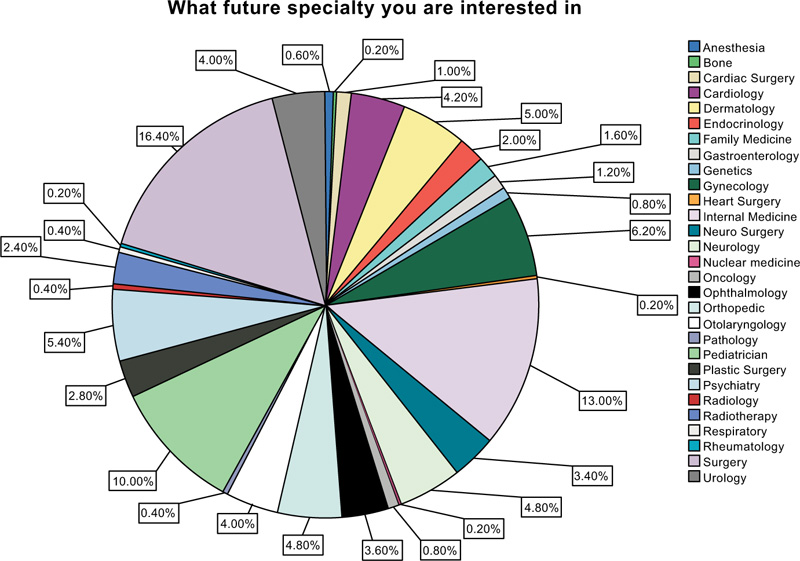
Most of the participants (77.4%, n=697) believed that artificial intelligence would play an important role in health care, with only a minority who did not agree or were neutral.
The majority (around 85% n= 765) of respondents heard about Artificial Intelligence or Machine learning, and around half of the participants (51.8%, n=466) read articles about artificial intelligence or machine learning in the last 2 years. Concerning attending courses about artificial intelligence/machine learning and data science in the last 5 years, the majority never attended any course (78.4%, n=706) followed by participants who attended one course only (11.6%, n=104). The courses attended were personal efforts of students as courses related to AI/ML were not part of any medical school curriculum.
With regard to the question related to the importance of AI in healthcare; an overwhelming majority of the respondents, 89% (n = 801) selected strongly agree or agree, whilst 1.8% (n=16) selected disagree or strongly disagree, and the remaining 9.2% (n = 83) were neutral. About the likelihood of having a carrier in radiology due to the advancement of AI, since radiology is one of the first medical divisions to use ML/AI, nearly half of the respondents 47% (n = 423) selected strongly agree or agree, whilst 17% (n = 153) selected disagree or strongly disagree, and the remaining 36% (n = 324) were neutral. Nearly half of the responders believed that AI would be replacing specialists in the future; 55.8% (n = 502) of respondents selected strongly agree or agree, whilst 25% (n = 225) selected disagree or strongly disagree, and the remaining 19.2% (n=173) were neutral. Regarding the question about understanding the basic principles of AI, most students had a basic knowledge with variable degree; about half of the respondents 47% (n = 423) selected strongly agree or agree, whilst 25% (n = 225) selected disagree or strongly disagree, and the remaining 28% (n = 252) were neutral. With regard to the question of being comfortable with the nomenclature related to AI; nearly half the respondents 45.5% (n = 410) selected strongly agree or agree, whilst 16% (n =144) selected disagree or strongly disagree, and the remaining 38.5% (n = 346) were neutral. Fig. (2) shows the responses for the questions group of AI understanding and importance.
With regard to the question relating to understanding AI limitations; the majority of the respondents 63.4% (n = 571) selected strongly agree or agree, whilst 15.6% (n = 140) selected disagree or strongly disagree, and the remaining 21% (n = 189) were neutral. About the benefits of teaching AI in the medical career question; the majority of the respondents 71.4% (n = 643) selected strongly agree or agree, whilst 7.8% (n = 70) selected disagree or strongly disagree, and the remaining 20.8% (n = 187) were neutral. A majority of students believed that there is a mandatory need for medical students to receive teaching in AL as around two-thirds of the respondents 68.4% (n = 616) selected strongly agree or agree, whilst 10.6% (n = 95) selected disagree or strongly disagree, and the remaining 21% (n = 189) were neutral. Regarding the question about confidentiality of using basic healthcare AI tools if required; most respondents 61.6% (n = 554) selected strongly agree or agree, compared to 19.6% (n =176) who selected disagree or strongly disagree, the remaining 18.9% (n = 170) were neutral. When asked if students are likely to have a better understanding of the methods used to assess healthcare AI algorithm performance after graduation; nearly half the respondents 56.2% (n = 506) selected strongly agree or agree, whilst 17.8% (n = 160) selected disagree or strongly disagree, and the remaining 26% (n = 234) were neutral. Regarding the question of possessing the knowledge needed to work with AI in routine clinical practice after graduation; nearly half the respondents 54% (n = 486) were comfortable with using IA, by selecting strongly agree or agree. However, 22% (n = 198) selected disagree or strongly disagree, and the remaining 24% (n = 216) were neutral. However, more than 60% of participants believed that students should receive teaching about artificial intelligence. Fig. (3) shows the responses for the questions group on AI combination with healthcare and the need for having courses during medical years of study.
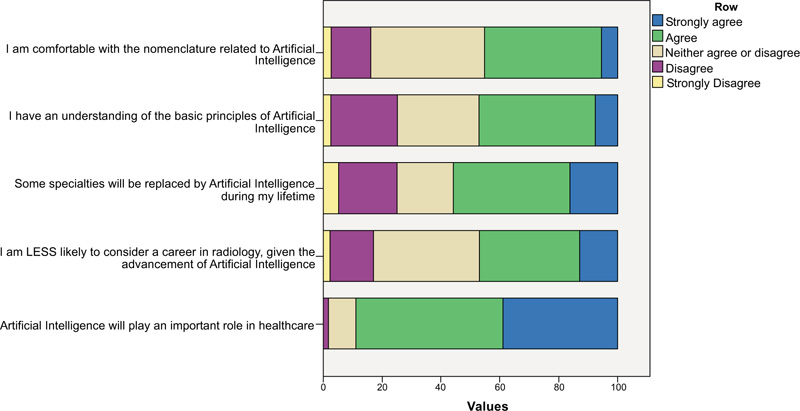
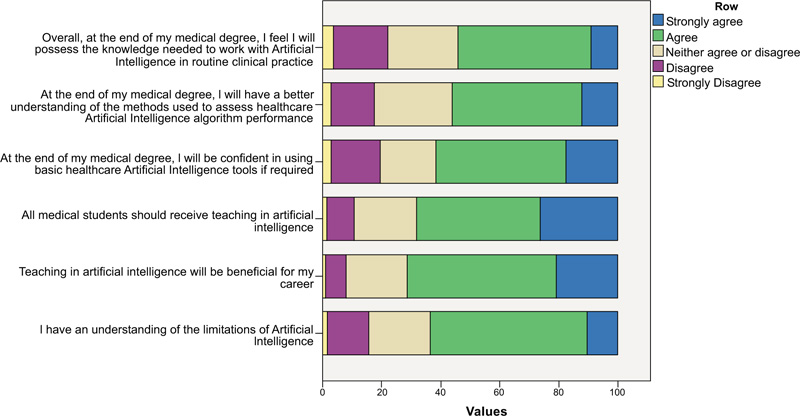
With regard to the participants’ opinion regarding whether AI/ML will drastically change and revolutionize the medical field in 10 years or not; the majority of the respondents that is 78.8% (n = 709) believed that it would by choosing strongly agree or agree, whilst 8.8% (n = 79) selected disagree or strongly disagree, and the remaining 12.4% (n = 112) were neutral. Regarding the belief that AI/ ML will be replacing doctors in the future; most of the respondents 65.8% (n = 592) disagreed and selected strongly disagree or disagree, whilst 19.4% (n = 175) selected agree or strongly agree, and the remaining 14.7% (n = 133) were neutral. For discouraging the participants to get into medicine because of AI/ML; the majority of the respondents that is 60% (n =540) disagreed and selected strongly disagree or disagree, whilst 18.8% (n = 169) selected agree or strongly agree, and the remaining 21.2% (n = 191) were neutral. Regarding the statement that AI/ML will eventually replace human doctors; the majority of the respondents 69.6% (n = 626) selected strongly disagree or disagree, whilst 17.2% (n = 155) selected agree or strongly agree, and the remaining 13.2% (n =119) were neutral. When asked about improving performance by having advance personal AI/ML knowledge; more than half the respondents 60.6% (n = 545) agreed by selecting strongly agree or agree, whilst 15.4% (n = 139) selected disagree or strongly disagree, and the remaining 24% (n = 216) were neutral. About the question on the demand of AI/ML education in medical school or residency; the majority of the respondents 62.8% (n = 565) selected strongly agree or agree, whilst 5.8% (n = 52) selected disagree or strongly disagree, and the remaining 31.4% (n = 283) were neutral. Fig. (4) shows the responses to the questions relating AI to medical study and its effects on future learning.
In the rating scale questions, about half of students rated the question about being self-perceived novices in AI/ML with 3 or more (around 51.6%) (n = 464). About planning to advance AI/ML knowledge to improve performance as future physicians, the majority were keen on doing so and rated the question with 4 in 33.8% of participants (n = 304), 28% of participants (n= 252) rated 3, 15.6% of them (n= 140) rated 5, and only 12.2% (n= 110) rated 2, and 10.4% (n = 94) rated it as 1. For how enthusiastic students were to be involved in AI/ML research, the majority were interested and gave a high rate to the question. Nearly 41.8% (n= 376) gave 4 and 5 points about its importance, followed by 30.4% (n= 274) rated it by 3, and the rest (27.8%) rated it with 1 and 2 (n = 250). Regarding the importance of integrating educational material about AI/ML into medical school curriculum, the majority gave a high rate to the question nearly 45.8% (n= 412) gave 4 and 5 points, followed by 28.2% (n= 254) rated it by 3, and the rest rated it with 1 and 2 by 26% (n = 234). With regard to the importance of clinical skills and knowledge training in residency about AI/ML, the majority believed in its importance and gave high rate to the question. Nearly 42.2% (n= 390) gave 4 and 5 points, followed by 28.8% (n= 260) rated it by 3, and the rest rated it with 1 and 2 by 27.8% (n= 250). Fig. (5) shows the summary of assessment questions about Artificial Intelligence/Machine Learning, future knowledge acquisition and advancements.
However, only 18.4% (n = 166) of the students have received teaching/training courses in AI, while the majority (81.6% n= 734) have never taken AI courses. Out of 166 students who have taken AI courses, 50% (n = 83) thought that teaching/training on AI/MI should be a compulsory part of their medical degree. Those students who have taken teaching/training in AI rated the courses as being extremely useful for 20.6% (n = 34), very useful with 39.1% (n = 65), somewhat useful with 29.3% (n = 48). However, 7.8% (n = 13) did not find them useful and 3.2% (n = 6) did not find it useful at all.
Students who received teaching/training in AI were more likely to agree on the important role of AI in healthcare (Wilcox test, p = 0.026).
Students who received teaching/training in AI were more likely to consider radiology as a future career, given the advancement in AI (Wilcox test, p = 0.000).
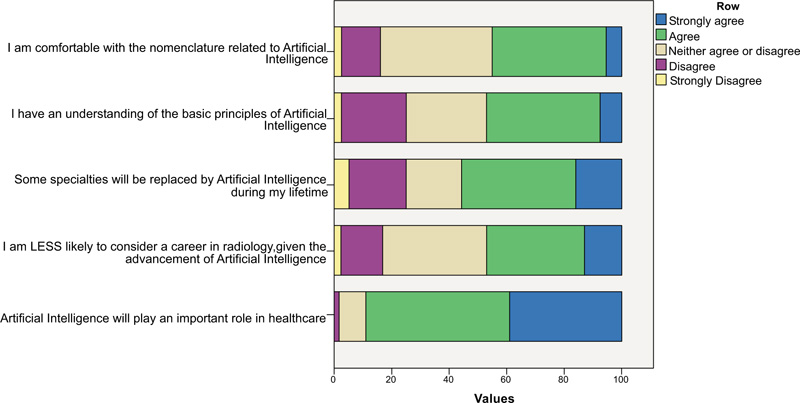
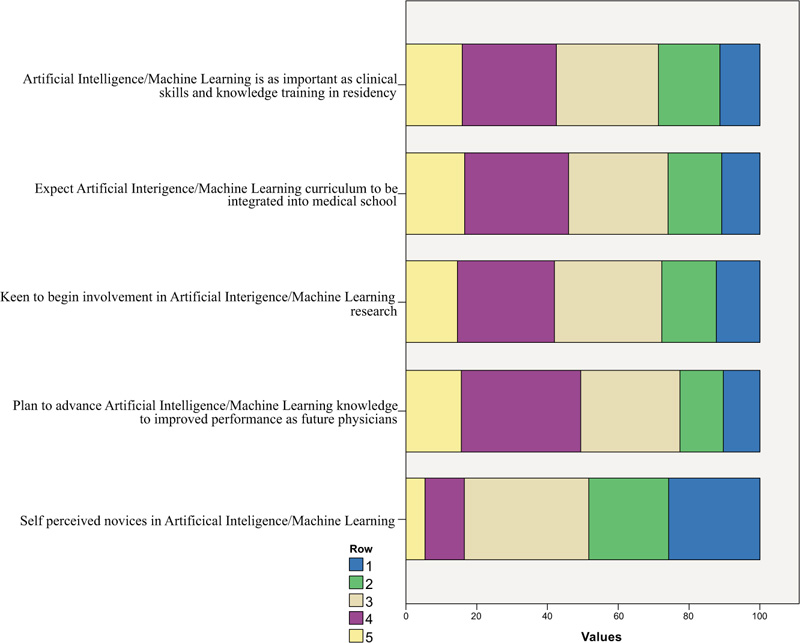
4. DISCUSSION
Artificial intelligence and machine learning will have a vital role in the future of different medical fields [1] and most medical students know the importance of AI and ML in improving medical applications [8, 9]. This study aimed to understand the knowledge of medical students in Jordan universities about machine learning, according to which 89% of the participants had previously heard about artificial intelligence and its importance (77.4) and around half (47%) understood the basic principles and were familiar with and comfortable with its nomenclature (45.5%). However, most of them have not read any articles or attended courses related to artificial intelligence. This could explain the fact that about half of the participants believed that AI will replace physicians in the future. Education about the positive aspects of machine learning roles may help shaping the correct perception and provide the students and health care practitioners the ability to selectively apply artificial intelligence with methods to avoid the negative aspects of this application [2]. In our cohort, around half of the students would not choose radiology as a future carrier. The negative influence on radiology recruitment secondary to advancement in AI was previously shown by Gong et al in a Canadian cohort [8], where one-sixth of medical students who were interested in radiology would not choose to study radiology as a future carrier. The Canadian study identified the main reason is that students believed that AI will replace radiologists in the future [8], a misconception which is also common in our cohort. Similar results were found from a survey of United Kingdom medical students [7]. On the other hand, a separate study by Pinto dos Santos et al. demonstrated that in their cohort the majority of students (83%) did not believe that AI would replace radiologists [9]. This belief may be the result of popular media and famous figures from the computer sciences who suggested that radiologists will not be replaced by machines in the future due to AI [10]. We believe that proper education about the potential use of AI and its limitation should be presented to students in a clear way to avoid this misconception.
In our cohort, most of the participants had an overall good level of knowledge about AI and ML. this was demonstrated by asking three basic questions about the understanding of the principles of AI, familiarity with associated nomenclature, and basic understanding of the current limitations of AI. However, most of them did not read or attend any scientific activity-related and none of them had training as part of their official study. A similar survey conducted on UK students demonstrated that less than half of students had some understanding of AI [7]. Pinto dos Santos et al. [9] showed that German students had an overall low level of knowledge about AI, with students stating that they acquired this from mainstream media rather than university teaching. They also highlighted that students who were more knowledgeable about AI were less afraid of working with technology which is similar to our finding [9]. It is interesting to note that most medical students in our cohort believed that AI should be compulsorily integrated into the medical school curriculum, and a similar majority believed on its beneficiary for their future. In our survey, it was found that there is lack of teaching materials concerning AI/ML in Jordanian Medical Schools, despite the fact that most students believed in its importance, a similar finding was suggested by Sit et al. in UK medical schools [7].
Furthermore, it was demonstrated that students who received training in AI/ML believed more significantly in the importance of the role of AI/ML in the future of medicine. It is widely accepted that AI will likely have an integral part in the future practice of many medical fields [1-5]. As a result, it is inevitable that AI and other digital tools will be integrated into clinical practice, regardless of specialty. A study from Korea suggested that Korean doctors and medical students believe in the role of AI in the medical field (83%) (558/669). Additionally, the majority of physicians surveyed thought that AI will not replace medical staff in the future (64.6%) (432 of 669) [11], which is consistent with our results. It is vital to equip our future physicians with sufficient knowledge and future doctors must possess the ability to use computers and software in a way that benefits evidence-based medicine use [7, 8].
LIMITATIONS
This current work has limitations, first participants were not asked background questions about AI. Each student has had a different understanding of AI, second a possible selection bias as students who were more motivated and who might have more positive attitudes completed the questionnaire. However, the answers were randomly selected and were from different years of study and the total number was higher than in previous similar works.
CONCLUSION
Medical students in Jordan are arranged to acknowledge AI application in clinical medication and social medical frameworks. They have a little resistance to AI in therapeutic instruction.
It is important to have training courses for those students about AI and ML to learn more about their full engagement with medical study. Students know about AI and ML, which emphasize that new generations care more about technology advancements in the medical field. In conclusion, it is important that medical students get good education about AI and ML advances in the medical filed and view their applications and the new trends of diagnosis and treatment. The need emerges to link between medicine concepts and their relationship with advancements in technology. AI and ML will pave the way for new and modern healthcare trends.
Therefore, it is essential to create more viable curricula, restorative teachers and clinical instructors ought to take these states of mind into consideration.
AUTHORS' CONTRIBUTIONS
All authors have equally contributed to collecting the data, analyzing the data, reviewing the literature, writing the first draft and revising and approving the final draft.
LIST OF ABBREVIATIONS
| AI | = Artificial Intelligence |
| ML | = Machine Learning |
ETHICS APPROVAL AND CONSENT TO PARTICIPATE
The manuscript has been approved by the Institutional review Board of the Jordan University Hospital, Amman, Jordan number 300/2020 and all participants agreed to participate. All methods were performed in accordance with the relevant guidelines and regulations. Informed consent was confirmed with individual participants at the start of the survey.
HUMAN AND ANIMAL RIGHTS
No animals were used in this research. All procedures performed in studies involving human participants were in accordance with the ethical standards of institutional and/or research committee and with the 1975 Declaration of Helsinki, as revised in 2013.
CONSENT FOR PUBLICATION
Informed consent was obtained from all participants.
STANDARDS OF REPORTING
STROBE guidelines were followed.
AVAILABILITY OF DATA AND MATERIALS
All data are available upon request from the corresponding author.
FUNDING
None.
CONFLICT OF INTEREST
The authors declare no conflict of interest financial or otherwise.
ACKNOWLEDGEMENTS
The authors acknowledge Faris Haddad M.D for his English editing of the manuscript.


